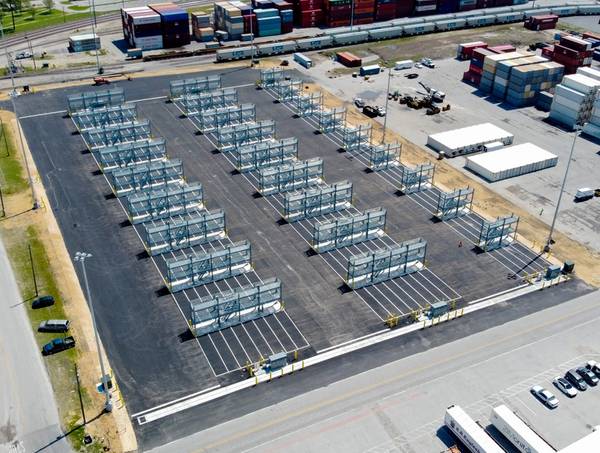
The new $14 million refrigerated container yard at the Port of Wilmington boosts on-terminal refrigerated container (reefer) plugs from 235 to 775 with the ability to expand to more than 1,000 plugs through Phase 2 of the project.
“North Carolina Ports has become a critical gateway for the movement of refrigerated cargoes. The completion of the refrigerated container yard allows NC Ports to better support the growing agriculture and grocery sectors across North Carolina and the entire southeastern United States,” said Paul J. Cozza, North Carolina Ports Executive Director.
The project includes a new reefer service area as well as 27 reefer racks to support the stacking of refrigerated containers. The new yard is positioned near the Port of Wilmington Cold Storage. The location consolidates all refrigerated cargo into one area which helps enhance the port’s efficiency when moving perishable goods.
“As North Carolina grows, it is important our business adapts to meet the needs of our existing and future customers. The new refrigerated container yard highlights NC Ports’ commitment to improving infrastructure as we move another step closer to becoming the next great cold cargo port,” added Hans C.E. Bean, Chief Commercial Officer, North Carolina Ports.
“Supporting the refrigerated cargo sector is a strategic goal for NC Ports. Our investment in the refrigerated container yard will help strengthen the Port of Wilmington’s position as a premier hub for perishables,” said Robert A. Wicker, Chairman of the North Carolina State Ports Authority Board of Directors.
The opening of the reefer yard comes as North Carolina Ports is experiencing unprecedented growth in the cold chain sector. Refrigerated container volume through the Port of Wilmington quadrupled from Fiscal Year 2014 to Fiscal Year 2019. FY20 year-to-date volumes have been trending up 30 percent as both export and import demand continues to grow. While the latest projections are dynamic, NC Ports is more equipped than ever to handle refrigerated cargo.
This project is another component of NC Ports’ more than $200 million capital improvements plan aimed at modernizing and enhancing efficiency at the Port of Wilmington. Infrastructure improvements include an overhaul of Wilmington’s container terminal and new terminal and gate operating systems. The terminal renovations will double the Port of Wilmington’s annual throughput capacity to 1.2 million TEUs and feature a new container gate complex with increased lanes for inbound and outbound truck traffic.



